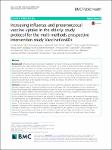Increasing influenza and pneumococcal vaccine uptake in the elderly: study protocol for the multi-methods prospective intervention study Vaccination60+
Betsch, Cornelia
Rossmann, Constanze
Pletz, Mathias W.
Vollmar, Horst C.
Freytag, Antje
Wichmann, Ole
Hanke, Regina
Hanke, Wolfgang
Heinemeier, Dorothee
Schmid, Philipp
Eitze, Sarah
Weber, Winja
Reinhardt, Anne
Küpke, Nora K.
Forstner, Christina
Fleischmann-Struzek, Carolin
Mikolajetz, Anna
Römhild, Josephine
Neufeind, Julia
Rieck, Thorsten
Suchecka, Kasia
Reinhart, Konrad
Background:
Influenza and pneumococcal vaccination can prevent disease and potentially life-threatening complications like sepsis. Elderly people have an increased risk of severe disease and therefore constitute a major target group for vaccination. To increase vaccination coverage, targeted interventions are needed that take theory-based specific determinants of vaccination behaviour into account. Moreover, message and campaign design should consider specific age-related characteristics (e.g., information processing, media use). The aim of this study is (i) to identify the specific informational and interventional needs of this risk group, (ii) to design and implement a targeted intervention aiming to decrease vaccine hesitancy, increase vaccine uptake and decrease the health and economic burden due to the respective diseases, and (iii) to measure the effect of this evidence-informed intervention on various levels.
Methods:
Prospective, multi-methods intervention study targeting individuals aged ≥60 years in a model region in Germany (federal state of Thuringia, 500,000 inhabitants ≥60 years old). The development of the intervention follows theory-based and evidence-informed principles: Data from a cross-sectional representative study provide insights into specific determinants of the target group’s vaccination behaviour. Additionally, media use is analysed to identify adequate communication channels for specific subgroups.
In pilot studies, the intervention materials are adapted to the specific cognitive requirements of the target group. For development and implementation of the intervention, an interdisciplinary and trans-sectoral approach is used, including psychology, communication science, design, medical science, epidemiology and various public health players. The intervention will be implemented in autumn and winter 2017/18 and 2018/19 and adjusted in between. Evaluation of the intervention includes: awareness, use and recall of intervention materials, effects on changes in determinants of vaccination behaviour, self-reported vaccine uptake, and vaccination coverage in the intervention area (primary outcomes), as well as disease incidences (secondary outcomes) and the economic burden of influenza, pneumonia, invasive pneumococcal disease and sepsis for the healthcare system (tertiary outcomes).
Discussion:
The data will add to the body of evidence on the effectiveness of evidence-informed vaccination campaign development as well as on the clinical and economic effects of pneumococcal and influenza vaccination. The effect of the intervention will teach valuable lessons about the principles of campaign development and evaluation, and can motivate a subsequent nationwide intervention.
Files in this item

